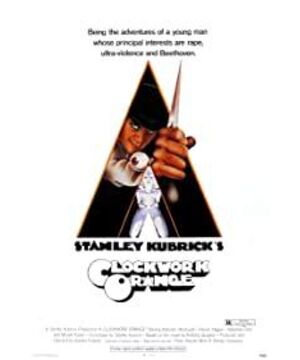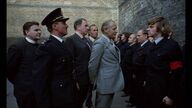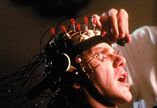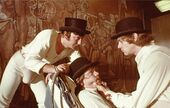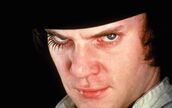Formalism from "A Clockwork Orange"
British 1971 Colours
Duration: 137 minutes Genre: Crime/Drama/Sci-Fi
Director: Stanley. Kubrick
Starring: Malcolm. McDowell, Patrick. Mike, Michael. Bates
Awards:
1971
New York Film Critics Association Best Picture, Best Director Award
1972
Academy Award Nominations for Best Film, Best Director, Best Screenplay, Best Editing
Hollywood Foreign Press Association Best Film, Best Actor, Best Director Golden Globe Nomination
1973
British Academy Award for Best Film, Best Screenplay, Best Cinematography, Best Sound, Best Editing, Best Art Direction, Best Director nomination
"A Clockwork Orange" takes the future society as the background, and tells the evil deeds and futile transformation of a youth obsessed with violence and pornography before and after being brainwashed by the government. The film takes aim directly at social ideology, Kubrick said: "The main point of the film calls into question the consciousness of human freedom. Everyone must live according to fixed ways and principles. When choosing to be a good person or a bad person, the power is taken away. In the future, will people really enjoy human rights?" This is indeed a thought-provoking topic, when people's free will conflicts with social ideology, will people still soberly judge what is human free will and what is the other way around. Is that what we should strive to maintain? And as a party, is it justified to give up his free will? In this game of minority and majority, weak and strong, is the individual of will still widely respected?
Of course, the film's handling of this game is extreme, and the extreme violence of the protagonist Alex is indeed disgusting, but relatively speaking, the extremeness of the government's almost dehumanizing brainwashing method is also uncomfortable. From time to time, your position will be erratic, and even at certain moments, the film is so confusing that we are even comforted by the actions of the powerful government. People's free will is even worthless in this game. As a movie watcher, you may be unknowingly bewitched by this social ideology, which is also the sadness of the public.
The expression of the film is quite formal, and the following is only to be explored in conjunction with the theme of the film.
1. Dialogue
The dialogue of the film is designed to be very staged, and the tone of the actors during the dialogue is also a stage-like recitation, and even the design of some lines is quite poetic. It seems that the actors are not performing a movie, but an opera on the stage. . This feeling deepens the exaggeration of the plot and adds to the sense of unrealism, which complements the film's surreal expression. The recitation-like dialogue makes people feel that the characters in the film seem to be so civilized, but what they do is extremely barbaric. It is this contrast that deepens the film's dark humor and sense of irony. Certain designs of the lines are also violent, such as referring to sexual intercourse as "the old in-and-out game of men and women."
2. Clothing
The costume design of this film is also distinctive, reflecting the formalism style of the whole film and the inner world of the characters. Here we only talk about the clothing styles of Alex and his entourage. The first shot of the film gives Alex a close-up of his face. The reversed false eyelashes and his unruly eyes reflect Alex's rebelliousness, as well as an offensive, retro top hat and straps It adds to the incongruity of the overall costume and reflects the grotesque nature of the film. The white bodysuit is an external manifestation of their ignorance, while the deliberately exaggerated primary characteristic is a sexual innuendo, combined with the death innuendo embodied by the fake organs oozing blood on their straps or cuffs, embodying their psyche in addition to violence And pornography is empty. Special mention should be made to the eyes on Alex's cuffs. These naked eyes are bloodshot, as if they had just been dug out from a living body. On the one hand, he observed this crazy world with helpless eyes. On the other hand, it contrasts with the eyes that Alex is forced to open as he is brainwashed later in the film, where there is a sense of sarcasm foreshadowing.
When several people commit murder, the mask that Alex wears resembles male genitalia, and the murder weapon used by several people also has this metaphor, which is an external manifestation of their naked sexual desire and desire for violence. In the record store, the phallus-shaped ice cream licked by the two girls is also the embodiment of human primitive desire.
3. Scene design
Milk Bar: The design of the milk bar is classic, the white sculptures of nude women especially highlight their eyelashes, hair and pubic hair, embodying an overall sexual innuendo, and drinking human milk from their breasts, on the one hand It shows the madness of this future society and the annihilation of human nature. On the other hand, it is a metaphor that these violent people grew up drinking the milk of society. It is this sick society that gave birth to their sick personalities.
The staged murder scene: As Alex's gang comes out of the milk bar, they come to a gathering of youths in Nazi costumes who are gang-raping a teenage girl, the crime scene is shelved On an opera stage, it seems that this is a high art for people to appreciate, but in fact it is a filthy crime. Violent attitude, for them, it is entertainment, embodies their depravity and darkness.
The set design of the room: several home sets appearing in this film basically have strong sexual implications, such as the huge erotic pictures on the walls, and the artworks in the shape of male genitalia displayed in the home, all of which reflect the whole society. The worship of pornography shows the primitive nature of man and suppresses his social self-discipline, which is the degeneration of the whole society. The design of Alex's room is simply a depiction of the young man's heart. The huge picture on the wall of a naked woman exposing her pussy symbolizes Alex's desire for pornography; while the group of Jesus dancing in ballet is painted under the blood. The sculptures symbolize the depravity of his soul and the cult of violence, and the absence of his faith; his bedspread, like a rock with horns and blood red, is a symbol of his aggressive external representation; His viper pet is the perfect footnote to Alex's twisted humanity, and in the drawer of the bed that symbolizes his body, it's his vicious mind. The only light in Alex's room is a window in the room, and here is a portrait of Beethoven, which symbolizes the only light worship in Alex's heart - music, the large record player in the room and the stacks of The record is also the embodiment of this theme. There are many more hints like this, like the doctored mural below Alex's house.
"Home": The house of Alex's murdered radical writer, named "Home", is bright, spacious, and intellectual (a room full of books). However, tearing apart the appearance of this layer of civilization, what we see later in the film is the male protagonist's strong revenge and violent tendencies, as well as the dark psychology of betraying Alex, a brainwashed victim, for his own fame. It is not safe or warm here, it is a mockery of the appearance of human civilization.
Hospital: The hospital where Alex was brainwashed was neat and pure white. The doctors and nurses were dressed in attire and had a sympathetic attitude. However, under this appearance, they carried out dehumanizing activities, which was an act of filth under the glossy appearance of the social rights organization. Satire. The hospital is a place to treat people, but it is actually poisoning the human mind, and this sense of perversion deepens the meaning of the design.
4. Soundtrack and sound effects:
At the beginning of the film, in the scene where Alex and his gang beat up the old beggars on the roadside, the strange laughter of these young people appears from time to time, which is the embodiment of their distorted personality and their distorted understanding of violence.
Most of the soundtracks in this film are loud and cheerful symphonies, but in this musical background, the characters in the film are carrying out extremely violent activities, the most obvious one being Alex beating the male host and raping the female at the writer's house. When the host, he sang "Song in the Rain" and danced cheerfully, and brutally beat the couple with the rhythm of the dance. The lyrical and cheerful impression of Song in the Rain was intertwined with this violent film performance, which made it even more exaggerated. Violent scenes are unforgettable. This is even more externalized: for them, violence is a form of entertainment.
The song sung in prison is also quite symbolic. The lyrics are like this: "I am a lost sheep, I don't like the sheepfold, I don't like the voice of the shepherd boy, I am not restrained." This is a song that advertises The song of freedom, but forced to sing by the warden in the special environment of the prison, reflects its irony.
5. Plot performance:
Regarding the plot performance of this film, here we focus on the plot performance after Alex was "cured" in the hospital. The plot takes place on a stage, and Alex is placed on it like a doll to be humiliated. The design of the spotlight makes this scene extremely dramatic and ironic. Alex lost the ability to maintain his personal dignity and went to lick his shoes; he lost his basic desires as a person, and he could not even satisfy his sexual desires. At this time, he no longer had the free will of a person, and he also lost his sound health. Personality, which is more terrible than violence, deprives people of their nature. When the person who beat him and the person who tempted him left the stage, they happily called the curtain down to the audience. The rulers in the audience applauded almost ecstatically. It can be seen that everyone here is crazy. Victory cheers, and the loss of humanity makes them ecstatic. This is the purpose of social ideology, trying to deprive people of their spiritual freedom. Sadly, Alex laughed too, his laugh so numb it was a sketch of a dehumanized slave. After returning home, he was deprived of even the right to be reunited with his relatives and could not fight back, and was beaten by his former servants who became the law enforcers of this society, and they were also villains. The saddest thing is that Alex was deprived of his last remaining love of music, and he hugged his head and wailed when he heard Beethoven's Ninth Symphony, which used to make him so happy and peaceful. This is the tragedy of human nature!
There are many more plot descriptions like this in this film, so I won't repeat them all here.
Through this film, I saw some basic features of formalism: exaggeration, emotionalization, randomization, close integration of externalization and inner description, etc. Combined with the viewing of "2001: A Space Odyssey", I have a general view of formalism films. With a basic perceptual understanding.
demon demon
Thursday, March 30, 2006
View more about A Clockwork Orange reviews


